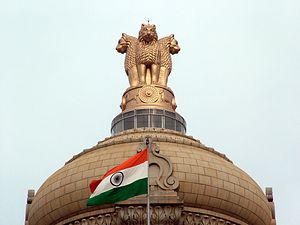“Dictator envy” isn’t a pretty phrase, but it’s one that is helpful in describing what more than a few Indians might feel when they look to Beijing’s way of doing things. Of course, this isn’t something unique to Indians. Even Alexis de Tocqueville, in his early days, held a somewhat skeptical view of democracy as a chaotic and childish attempt to run “the circus from the monkey cage” (as H. L. Mencken would later put it). Tocqueville, who later authored the seminal “Democracy in America,” came around to the social, psychological and political benefits of democracies. Contemporary Americans, jaded by dysfunctional congressional politics, sequesters and shut-downs, may also see the merits of a technocratic oligarchy (just don’t call it a Politburo Standing Committee).
In the Indian case, it’s worth revisiting this theme in light of Beijing’s much-heralded Third Plenum (which I covered for The Diplomat in an earlier piece). I recently ran across a column by former Indian foreign secretary Shyam Saran in the Business Standard reflecting on the Third Plenum. He writes that there should be “no doubt” that the Third Plenum will reinvigorate Indian “dictator envy.” Saran, however, urges Indians not to fall prey to this logic. He proffers a methodical repudiation:
“India is not China, and our own experience has demonstrated that any recourse to authoritarianism can only achieve temporary results. Nor has the practice of liberal democracy in our country proved to be incompatible with high rates of GDP growth. … China’s example should not become the defining template for India’s development in the 21st century.”
India isn’t alien to authoritarianism – Indira Gandhi’s imposition of a state of emergency from 1975 to 1977 is now seen as one of the darkest points in India’s political evolution. This is the episode that Saran references at the outset of the above passage. He is also correct to point out that Indian democracy isn’t necessarily immune to the sort of growth that China experienced – India saw annual growth rates of up to 11 percent in its very recent memory.
Saran has a prescription for what India really needs to put an end to any “dictator envy” it might be experiencing in the wake of the Third Plenum, or indeed, in general comparisons to China: “What has been evident in the past few years is a failure of imagination on the part of India’s elite and the lack of articulation of an overarching national narrative that is able to cut across India’s rich diversity and political and social plurality in order to sustain a journey towards a common destination.” In essence, Indian democracy needs an FDR or a Clement Attlee – a democratic leader capable of not only restoring a modicum of faith in the national institution, but ultimately delivering growth.
Considering contemporary Indian politics, and the upcoming elections, discussions of “dictator envy” in India begin to look less abstract and more salient. It’s no secret that amid falling growth rates, several revelations about endemic corruption, and generally poor governance, India’s current United Progressive Alliance (UPA) coalition has seen significant losses in popularity. This has of course hugely benefited the opposition Bharatiya Janata Party’s (BJP) candidate, Narendra Modi, who is perceived widely a heavy-handed, pragmatic, strongman.
The upcoming elections in India in 2014 will serve as a referendum on the Congress-led UPA coalition. Narendra Modi’s burgeoning popularity in India has everything to do with simply how different he appears from the current prime minister and his entourage. There is a perception that Modi could be precisely the sort of heavy-handed visionary India needs to whip its institutions into shape – by any means necessary. Modi, of course, is a complex political package, not alien to controversy. Considering Modi’s political ascent in light of India’s somewhat chronic “dictator envy” does seem to send a chilling message about the damage done to liberal democracy in India over years of institutional erosion.
Another columnist, Pratap Bhanu Mehta of the Centre for Policy Research, wrote in The Indian Express this week that should Modi win, he should understand that “winning an election is not the same thing as having a wider moral legitimacy that allows you to govern well.”
The stories of India and China’s rises in Asia have almost served as a controlled experiment of sorts – what sort of political organization works well for rapid modernization and development? The numbers favor China on almost every count, even controlling for India’s slightly more impoverished start-state in 1947. Despite its constant second-place standing to China, India and its leaders should reaffirm their belief in the great Indian democratic experiment and work on reforming institutions and politics. A Modi election might provide some short-term reprieve to a damaged national political narrative, but longer-term, India could show that even democracy, with all its chaos and confusion, can bring about prosperity.
The Third Plenum may be a jarring reminder of the perks of authoritarian, top-down economic planning, but you’ll see few experts prognosticating the end of Indian democracy compared to the end of the Chinese Communist Party. Authoritarian legitimacy derived entirely from economic performance is a precarious political arrangement in the long run – just ask the Soviet Union. Indeed, in case of “dictator envy,” think “June 4, 1989,” not “Third Plenum.”

































